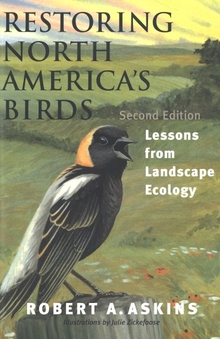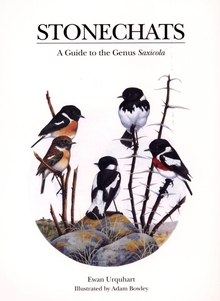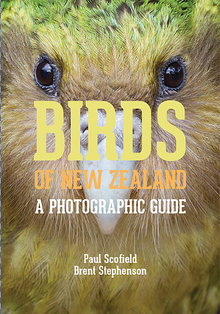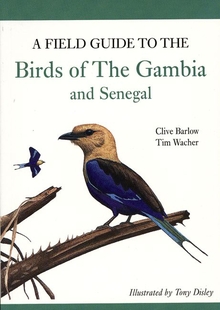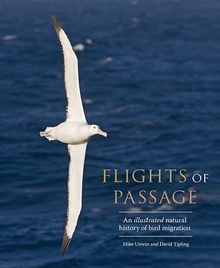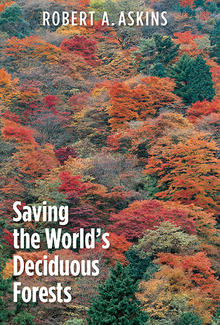Restoring North America's Birds
WARNING
You are viewing an older version of the Yalebooks website. Please visit out new website with more updated information and a better user experience: https://www.yalebooks.com
Lessons from Landscape Ecology
Robert A. Askins; Illustrations by Julie Zickefoose
Praise for the earlier edition:
"This book is first-rate—very broad in scope and appeal, readable, and truly integrative in its coverage of landscape ecology and its implications for avian conservation biology. . . . It will be of significant interest to researchers and students of conservation biology, ornithology and ecology; land managers; conservation agencies; and anyone with an interest in protecting the rich avian diversity of North America."—Trevor E. Pitcher, American Scientist
"This wonderful book . . . is especially relevant for conservation biologists from all walks of life."—Kathryn E. Sieving, Auk
"An enjoyable read for anyone, from the amateur birder to the professional scientist."—J. Michael Reed, Ecology
Robert A. Askins is professor of zoology and director of the Goodwin-Niering Center for Conservation Biology and Environmental Studies at Connecticut College.
"Robert Askins has artfully blended natural history and science into a format that should prove equally useful to land stewards, conservation managers, birders and anyone interested in understanding and preserving North America's avifauna. Using thoughtfully selected examples, the author seamlessly correlates ecological principles with changes in bird populations since the arrival of Western man. Most importantly, this book provides a template for directing future bird conservation efforts in North America."—Wayne R. Peterson, Vice President, American Birding Association, Field Ornithologist, Massachusetts Audubon Society
"Askins' book is clearly and accessibly written for land managers, conservationists, birders, and anyone else with a keen interest in conserving birds. His writing simplifies and clarifies the difficult principles of the emerging science of landscape ecology; it is one of the first books to point out the tremendous importance of natural disturbances (flooding, fire, grazing) in maintaining biodiversity. Throughout, Askins provides cautionary tales about the tragic loss of birds and ecosystems, but he also gives us practical recommendations for conserving what we have left, which creates an overall tone of cautious optimism."—Scott K. Robinson, Professor (and Head of) of Department of Ecology, Ethology, and Evolution, University of Illinois.
"How can habitats be managed to maintain bird populations? Robert A. Askins . . . provides some answers in Restoring North America’s Birds: Lessons from Landscape Ecology. . . . This . . . thorough book pulls together recent research in bird ecology to answer such questions as how we can sustain the diversity of birds on land that is used for timber harvesting, ranching and farming, or whether it is more effective to establish and protect strict nature preserves. Askins profiles a plethora of species, then offers specific recommendations for protecting their habitats."—Publishers Weekly
"Askins has done a masterly job of synthesizing and clarifying this data, using as examples selected major North American bird habitats such as East Coast grasslands, Southwestern streamside woodlands, Western mountain forests, and Southern pine savannahs and threatened bird species including the Red-Cockaded Woodpecker, and Marbled Murrelet. . . . The writing is clear, straightforward, and engaging. This landmark book for bird conservation is essential for all academic libraries and all public libraries with large environmental collections."—Library Journal
"An extremely important book for land managers, ecologists, and conservationists, who are attempting to maintain the biodiversity of North America, and especially to preserve its birds. Most highly recommended."—Wildlife Activist
"Readers who want broader coverage, more scientific data, and a comprehensive discussion of avian ecology and conservation will enjoy Robert Askins’ fine survey of these issues, Restoring North America’s Birds."—John R. Alden, Philadelphia Inquirer
"Writing first as a scientist and second as a conservationist, Askins describes how North American birds have fared under the pressure of our nation’s settlement and development. He details how scores of American bird species have declined because of habitat fragmentation and the disruption of natural vegetation patterns resulting from the cutting of forests, clearing of brush, grazing of livestock, taming of rivers, draining of wetlands and suppression of fire."—Elizabeth Grossman, Washington Post Book World
"This book is first-rate—very broad in scope and appeal, readable, and truly integrative in its coverage of landscape ecology and its implications for avian conservation biology. . . . This book will be of significant interest to researchers and students of conservation biology, ornithology and ecology; land managers; conservation agencies; and anyone with and interest in protecting the rich avian diversity of North America. One comes away from the book with a much better understanding of landscape ecology and how it ties in with avian conservation biology."—Trevor E. Pitcher, American Scientist
"Anyone questioning why wild birds are ‘flagships for conservation’ will find their answers in this wonderful book. Robert Askins’ eyes-wide-open approach to the task set forth in the title is utterly engaging, and . . . is especially relevant for conservation biologists from all walks of life. Reading Askins’ book was like being a student in a field course! In the first nine chapters . . . I romped through the major biomes and habitats of North America, looking at each through the eyes of an experienced and impassioned naturalist-ornithologist. . . . Restoring North America’s Birds educated the reader in much the same way as an elaborate and intensive field course in landscape ecology. . . . Restoring North America’s Birds should be available in every kind of library because its relevance to conservation crosses all societal boundaries."—Kathryn E. Sieving, Auk
"Illuminating the complex relations between bird populations and human uses of the land is no easy task, but author Robert Askins . . . has done an impressive job. . . . [The] evocative paintings of declining and extinct species open each chapter with poignancy and grace."—Ed Kanze, Bird Watcher’s Digest
"Having already distinguished himself as one of the more prolific and forward-thinking conservation ornithologists in North America, Askins documents how historical context, landscapes, and current management practices must come together if avian conservation is to be successful in North America. . . . A very readable and informative work."—J. Drew Lanham, Journal of Forestry
"Restoring North America’s Birds may be most valuable for teachers. Here, under one cover, is a treatise on ornithology, conservation biology, and landscape ecology, integrated in a way that will help students understand the warp and woof of living and nonliving factors that make up the delicate weave of ecosystems."—Robert T. McMaster, Natural Areas Journal
"Restoring North American Birds is easy to read and informative, and could be an enjoyable read for anyone, from the amateur birder to the professional scientist."—J. Michael Reed, Ecology
"A bold look at what can be done and what needs to be done to preserve America’s avifauna. . . . A fine review of recent research on bird species and their habitats, showing how basic ecological principles can be applied in different situations, both current and historical. Focuses on birds of the great plains, eastern forest, western mountain slopes, and longleaf pine woodlands."—Northeastern Naturalist
"Here, under one cover, is a treatise on ornithology, conservation biology, and landscape ecology, integrated in a way that will help students understand the warp and woof of living and nonliving factors that make up the delicate weave of ecosystems."—Robert T. McMaster, Natural Areas Journal
"This enjoyable and informative book places current thinking on bird ecology and conservation into themes of particular relevance to land managers and birders."—John R. Sauer, Quarterly Review of Biology
"A well-researched easy-read, characterizing major North American habitats and their array of birds from pre-settlement to present. . . . The author’s historical interpretations and comparisons among regions of human-related influences on bird habitat are significant contributions. The content is therefore suitable for any conservation enthusiast. . . . In an undergraduate setting, the book is appropriate for a one-credit seminar in topics such as introductory conservation biology, applied biogeography, or ornithology."—The Prairie Naturalist
"For anyone interested in preserving the rich avian diversity of North America, this book is welcome and essential. . . . I highly recommend this book to all interested in conservation. Armed with the knowledge it contains, you will be better able to participate in land management debates. And, you will have a greater appreciation of the need for supporting conservation organizations that are working to implement the recommendations that Askins sets forth."—Christopher Wilson, Audobon Naturalist News
"No one before has put bird conservation problems into such a comprehensive ecosystem and landscape perspective. Askins’ book is original, compelling, and appealingly written."—Thomas W. Sherry, Tulane University
Publication Date: May 11, 2002
72 b/w illus.

